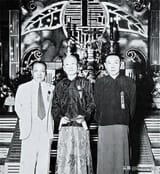Search Results
7/6/2025, 10:12:31 PM
>>17820146
>The Green Gang (Chinese: 青幫; pinyin: Qīng Bāng) was a Chinese secret society and criminal organization, which was prominent in criminal, social and political activity in Shanghai during the early to mid 20th century
>By the 20th century it had acquired such wealth and power that it had become corrupt, and included many successful businessmen. Under Du Yuesheng, it controlled the criminal activities in the entire city of Shanghai. The Green Gang focused on opium (which was supported by local warlords), extortion, gambling, and prostitution. Shanghai was considered by some the vice capital of the world at that time
>The Green Gang was often hired by Chiang Kai-shek's Kuomintang to break up union meetings and labor strikes and was also involved in the Chinese Civil War. One of the leaders of the Green Gang, Ying Guixin, was also involved in Yuan Shikai's assassination of the rival politician Song Jiaoren in 1913. Carrying the name of the Society for Common Progress, it was — along with other criminal gangs — responsible for the White Terror massacre of approximately 5,000 pro-Communist strikers in Shanghai in April 1927, which was ordered by Nationalist leader Chiang Kai-shek. Chiang granted Du Yuesheng the rank of general in the National Revolutionary Army later
>The Green Gang was a major financial supporter of Chiang Kai-shek, who became acquainted with the gang when he lived in Shanghai from 1915 to 1923. The Green Gang shared its profits from the drug trade with the Kuomintang after the creation of the Opium Suppression Bureau. Chiang Kai-shek's brother-in-law and financial minister T. V. Soong also partnered with the pro-Chiang Green Gang to pressure Shanghai banks to buy up national securities. In the last two years of the Nanjing decade (1936–1937), the Green Gang continued to pressure big business to buy up national bonds, as a means of compensating for the lack of corporate tax imposed by the government
>The Green Gang (Chinese: 青幫; pinyin: Qīng Bāng) was a Chinese secret society and criminal organization, which was prominent in criminal, social and political activity in Shanghai during the early to mid 20th century
>By the 20th century it had acquired such wealth and power that it had become corrupt, and included many successful businessmen. Under Du Yuesheng, it controlled the criminal activities in the entire city of Shanghai. The Green Gang focused on opium (which was supported by local warlords), extortion, gambling, and prostitution. Shanghai was considered by some the vice capital of the world at that time
>The Green Gang was often hired by Chiang Kai-shek's Kuomintang to break up union meetings and labor strikes and was also involved in the Chinese Civil War. One of the leaders of the Green Gang, Ying Guixin, was also involved in Yuan Shikai's assassination of the rival politician Song Jiaoren in 1913. Carrying the name of the Society for Common Progress, it was — along with other criminal gangs — responsible for the White Terror massacre of approximately 5,000 pro-Communist strikers in Shanghai in April 1927, which was ordered by Nationalist leader Chiang Kai-shek. Chiang granted Du Yuesheng the rank of general in the National Revolutionary Army later
>The Green Gang was a major financial supporter of Chiang Kai-shek, who became acquainted with the gang when he lived in Shanghai from 1915 to 1923. The Green Gang shared its profits from the drug trade with the Kuomintang after the creation of the Opium Suppression Bureau. Chiang Kai-shek's brother-in-law and financial minister T. V. Soong also partnered with the pro-Chiang Green Gang to pressure Shanghai banks to buy up national securities. In the last two years of the Nanjing decade (1936–1937), the Green Gang continued to pressure big business to buy up national bonds, as a means of compensating for the lack of corporate tax imposed by the government
Page 1
